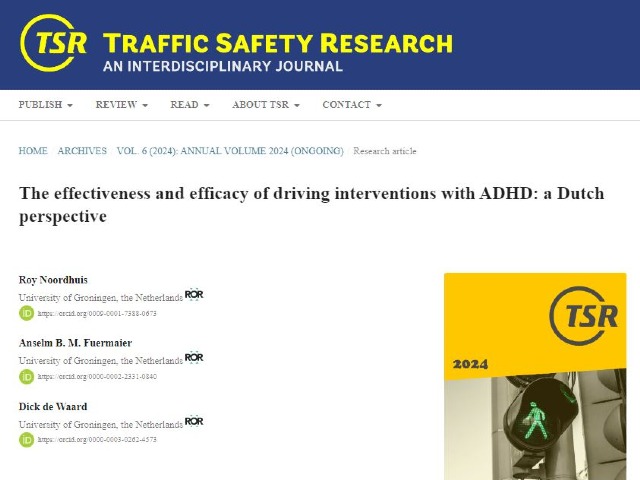Open access publication in the spotlight - 'The effectiveness and efficacy of driving interventions with ADHD: a Dutch perspective'
| Date: | 24 September 2024 |
| Author: | Open Access Team |
This month's publication in the spotlight reviews three potential driving interventions to discern their impact on road safety when implemented specifically for drivers with ADHD.
Publishing an open access book on psychosocial support methods for people with intellectual disabilities
| Date: | 28 June 2024 |
| Author: | Babette Knauer |
The book is edited by Alain Dekker, Irene IJpma and Martha Martens. In this interview, editor and author Alain Dekker (UG/UMCG) describes his motivation and experience with publishing an open access book.
Strengthening Scientific Integrity: An Interview with Michiel de Boer, Founder of the Dutch Reproducibility Network
| Date: | 24 June 2024 |
| Author: | Ana Ranitovic |
The Network promotes reproducibility and transparency in all scholarly disciplines a.o. through training activities and by sharing best practices and supporting meta-scientific research.
Pledging to sustainable open access in the field of cognitive sciences
| Date: | 21 June 2024 |
| Author: | Giulia Trentacosti |
Researchers who join ‘Collective Action in Science Diamond’ promise to publish (at least) one diamond open access article in the coming five years.
Open access publication in the spotlight - 'A Universal Cognitive Bias in Word Order: Evidence From Speakers Whose Language Goes Against It'
| Date: | 21 June 2024 |
| Author: | Open Access Team |
What is the source of commonalities among languages in the world? In this article, Alexander Martin (Faculty of Arts) and co-authors explore this question by making a comparison between word-order preference of speakers of Kîîtharaka and English.
Open access publication in the spotlight for the month (May) - 'Vocation as tragedy: Love and knowledge in the lives of the Mills, the Webers, and the Russells'
| Date: | 31 May 2024 |
| Author: | Open Access Team |
Can love affect knowledge and knowledge affect love? John Stuart Mill and Harriet Taylor-Mill, Max and Marianne Weber, and Bertrand and Dora Russell had a definite vocation: they wanted to change the world.
Publishing an open access book series - an interview with Annie van den Oever and Maryse Elliott about the Key Debates book series by AUP
| Date: | 29 May 2024 |
| Author: | Giulia Trentacosti |
How can you publish a book - and even a whole series - open access? What are challenges and what support is available? We talked with the two editors of an academic book series in film studies.
Open access publication in the spotlight (April) - 'Sharing with minimal regulation? Evidence from neighborhood book exchange'
| Date: | 24 April 2024 |
| Author: | Open Access Team |
You probably have seen them around the city: little free libraries. Authors Anouk Schippers and Adriaan Soetevent (Faculty of Economics and Business) did research on them and found that there is surprisingly limited free riding among its users.
Open access publication in the spotlight (March) - 'Gender differences in Dutch research funding over time: A statistical investigation of the innovation scheme 2012–2021'
| Date: | 21 March 2024 |
| Author: | Open Access Team |
This month's article studies whether or not the Dutch Research Council (NWO) has been successful in removing gender differences from their Talent Programme funding scheme. We asked corresponding author Casper Albers (Faculty of Behavioural and Social Sciences) to tell us more.
Good practices for FAIR data management - an interview with Kasper Meijer on ‘The seafloor from a trait perspective. A comprehensive life history dataset of soft sediment macrozoobenthos’
| Date: | 04 March 2024 |
| Author: | Alba Soares Capellas |
We asked co-author Kasper Meijer to tell us more about his publication in Scientific Data, an open access journal for descriptions of datasets and research that advances the sharing and reuse of scientific data.












